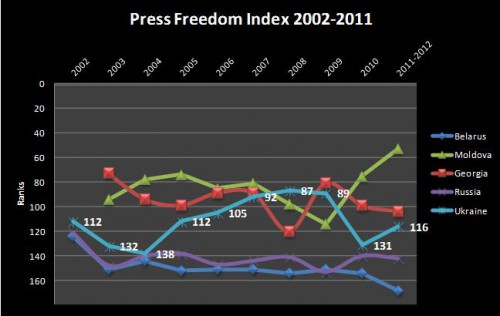26th January 2012
Freedom of the media in Ukraine
Back in July 2010 I wrote a blog called How to stop censorship in Ukraine. Based on a discussion with journalists, I noted both areas for concern and some areas for optimism; and observed that freedom of the media would be critical for Ukraine’s relationship with the EU because the Copenhagen criteria, which set out the conditions for would-be EU member states, included “stability of institutions guaranteeing democracy, the rule of law, human rights and respect for and protection of minorities”.
I thought of that discussion when international media watchdog Reporters Without Borders this week released their press freedom index for 2011. In the index, Ukraine improves its position from 131st place in 2010 to 116th place in 2011, out of 179 countries. This put Ukraine ahead of Tajikistan (place 122), Russia (142), Kazakhstan (154), Uzbekistan (157), Azerbaijan (162), Belarus (168) and Turkmenistan (177). But the index expressed concern about negative tendencies in Ukraine, including physical attacks against journalists going unpunished, and pointed out that Ukraine was not doing as well as Kyrgyzstan (place 108), Georgia (104), Armenia (77) and Moldova (53). Moldova’s star rating, incidentally, ties in with its recent success in overtaking Ukraine as the “most free” country amongst those listed here according to the annual rankings by the US-based NGO Freedom House.
One special problem of Ukraine is the phenomenon of so called “jinsa”, whereby political parties and others surreptitiously pay for media coverage. In my piece “Ukraine: Freedoms under threat?” for Investgazeta of 14 December 2010 I suggested that media magnates who ran TV channels or newspapers without “jinsa” should display a “Jinsa No Thanks” logo. Unfortunately, this recent piece in the Kyiv Post suggests there is little sign of progress.
It’s good to see Ukraine rising up an international ranking. But the Reporters Without Borders assessment, and the problem of “jinsa”, show that Ukraine could still substantially improve its position. My impression from talking to journalists in Kyiv and in the regions is that many in the media, particularly outside Kyiv, still feel they run a risk of actual physical danger if they investigate official corruption, for example, too vigorously. There is also a good argument that, for a country aspiring to EU membership, place 116 on an index of 179 countries worldwide is not good enough. I would welcome any comments, particularly from actual journalists, about how they rate media freedoms in Ukraine.

This has been swept under the carpet since 2010 :
Missing Kharkiv editor ran small newspaper covering corruption
Sep 2, 2010 at 23:31 | Elena Lvova
.
Kharkiv police chief suspects editor was murdered because of his professional activity.
Read more:
http://www.kyivpost.com/news/nation/detail/80896/#ixzz1CWGfiA6U
There are just numbers, but there is no soul in it. Numbers can be changed any time, but the sense of the censorship in Ukraine is not going to be changed until Mr. Yanukovich runs the country. There are so many cases when journalists do not publish their articles just because they are afraid for their safety. It’s a human factor, what is it better for you, to stay alive, but keep your mouth shut, or speak out and be killed. You make your own choice.
The ranking is because they “forgot” to murder a journalist last year.
I’m not surprised by Ukraine’s low ratings. When powerful media channels like TV or newspapers fall under the control of economic or political power groups/oligarchs, this significantly deforms democracy. But the mass scale advent of Internet and PC software in everyday life presumes the introduction of new schemes and mechanisms for the creation, distribution and consumption of information. The internet environment is aiding the fragmentation of audiences, but still fails to change the prevailing vertical communication model. In Ukraine we haven’t feedback from officials on the issues we have covered on the internet in most cases. The problem seems not specific to Ukraine, David Cameron even said his government is considering banning people from using social networks and BlackBerry’s who are suspected of inciting violence.The moment Internet finally succeeds would probably bring about large functional restructuring of the traditional mass-media system.
I think this ranking is way too high for Ukraine. Corruption is so bad (although getting better) that it is all too easy to influence the press by direct means [paying money for good press or make the story disappear] or by indirectly making problems for the good reporters [police are easy to buy or nasty thugs are enough most times].
And if you go away from the big cities it just gets worse, the level of corruption is really shocking for a developed country such as Ukraine. It needs to be fixed if the media is to have any confidence in reporting the truth!